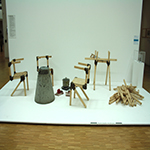Euroacademia Conferences
 Europe Inside-Out: Europe and Europeanness Exposed to Plural Observers (9th Edition) April 24 - 25, 2020
Europe Inside-Out: Europe and Europeanness Exposed to Plural Observers (9th Edition) April 24 - 25, 2020 Identities and Identifications: Politicized Uses of Collective Identities (9th Edition) June 12 - 13, 2020
Identities and Identifications: Politicized Uses of Collective Identities (9th Edition) June 12 - 13, 2020 8th Forum of Critical Studies: Asking Big Questions Again January 24 - 25, 2020
8th Forum of Critical Studies: Asking Big Questions Again January 24 - 25, 2020 Re-Inventing Eastern Europe (7th Edition) December 13 - 14, 2019
Re-Inventing Eastern Europe (7th Edition) December 13 - 14, 2019 The European Union and the Politicization of Europe (8th Edition) October 25 - 26, 2019
The European Union and the Politicization of Europe (8th Edition) October 25 - 26, 2019 Identities and Identifications: Politicized Uses of Collective Identities (8th Edition) June 28 - 29, 2019
Identities and Identifications: Politicized Uses of Collective Identities (8th Edition) June 28 - 29, 2019 The European Union and the Politicization of Europe (7th Edition) January 25 - 26, 2019
The European Union and the Politicization of Europe (7th Edition) January 25 - 26, 2019 7th Forum of Critical Studies: Asking Big Questions Again November 23 - 24, 2018
7th Forum of Critical Studies: Asking Big Questions Again November 23 - 24, 2018 Europe Inside-Out: Europe and Europeanness Exposed to Plural Observers (8th Edition) September 28 - 30, 2018
Europe Inside-Out: Europe and Europeanness Exposed to Plural Observers (8th Edition) September 28 - 30, 2018 Identities and Identifications: Politicized Uses of Collective Identities (7th Edition) June 14 - 15, 2018
Identities and Identifications: Politicized Uses of Collective Identities (7th Edition) June 14 - 15, 2018
Social Causes and the Pursuit of Social Beliefs
-
-

-
Presentation speakers
- Christoforos Ioannidis, King’s College London, UK
- Download presentation
Abstract:
How do we form beliefs? This is obviously an epistemological, thus philosophical, question. This paper explores the formation of social beliefs in particular, and the social causes that bring them about. I argue that in the modern world, one main social cause, namely the media, presents information and evidence, or ‘evidence’, in such a way, so that given certain assumptions of human psychology (which I will prove with certain experiments done in the field of psychology), people using media make people have certain social beliefs that would be unjustified if the belief formation process had been performed in a more neutral and personal environment. I finally suggest that art could be a way with which people can communicate in a safer environment so that individuals can allow themselves to reason better about their beliefs, and reach justified (and hopefully true) beliefs. I use Aronson’s model of the analogy of pyramid to explain the belief formation process in modern societies. This model shows how it is often the case that the factor that may determine whether an individual becomes more and more confident about a belief he starts to form may even depend on luck, and how it is that while going down at the same side of the pyramid, the conviction of the individual becomes stronger and stronger. I will use extreme examples, like how individuals came to strongly believe that the end of the world would come about on the 21st October 2011 after listening to Harold Camping on the radio. I will explain why art could help individuals form social beliefs in a safer environment and open the floor for discussion. My project has been inspired by the event ‘Truths, beliefs, convictions’ which took place at King’s College London, by Dr Kris de Meyer.
-
Related Presentations

Identity and Antagonism in the Nagorno-Karabakh Conflict
- Imogen Davidson White

Purism: Meta-Politicized Concrescence and Critique
- Lorena Morales Aparicio

Plural Subject: Art and Philosophy after the Crisis
- Magdalena Radomska















